LETTERS FROM MOTOR CONTRACTORS.
Page 19
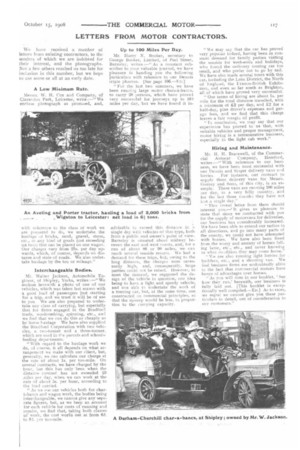
Page 20
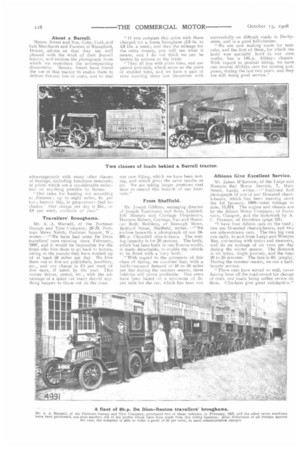
Page 21
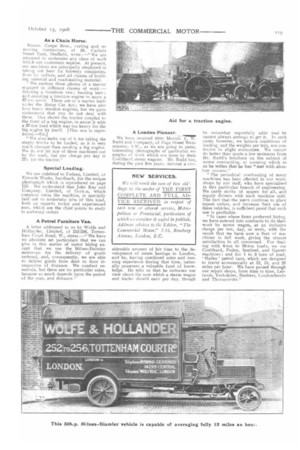
Page 22
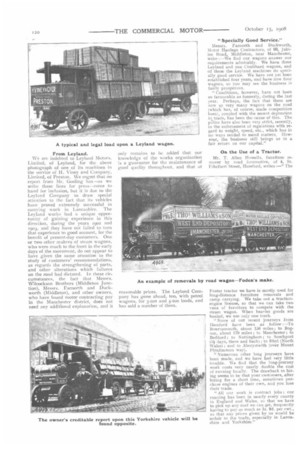
Page 23
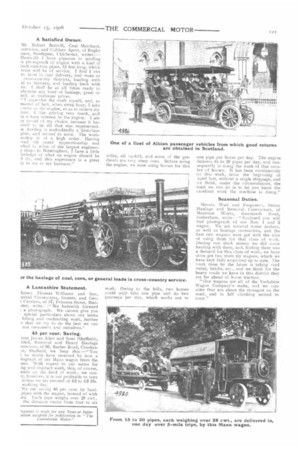
If you've noticed an error in this article please click here to report it so we can fix it.
We have received a number of letters from existing contractors, to the senders of which we are indebted for their interest, and the photographs. Nor a few others reached us too late for inclusion in this number, but we hope to use some or all at an early date.
A Low Minimum Rate.
Messrs, NV. H. Cox and Company, of Clarendon Park, Leicester, write :—" We enclose photograph as promised, and, with reference to the class of work we are prepared to do, we undertake the haulage of bricks, sand, gravel, stone, etc., or any kind of goods (not exceeding six tons) that can be placed on one wagon. Our charges vary from 25s. per day upwards, which, of course, depends on distance and state of roads. We also undertake haulage by the ton or mileage."
Interchangeable Bodies.
Mr. Walter Jackson, Automobile Engineer, of Shipley, Yorks, writes :—" We enclose herewith a photo of one of our vehicles, which was taken last season with a good load of passengers just starting for a trip, and we trust it will be of use to you We are also prepared to undertake any class of carrying, but especially that for firms engaged in the Bradford trade, woolcombing, spinning, etc., and we find that we can du this as cheaply as by horse haulage We have also supplied the Bradford Corporation with two velecies, a two-tonner and a three-tonner, which are used in tee parcels and schoolsfeeding departments.
"With regard to the haulage work we do, of course, it all depends on what arrangement we make with our client, but, generally, we cats calculate our charge at the rate of about Is. per ton-mile. On several contracts, we have charged by the hem-, but this has only been when the distance covered has not exceeded 20 eliIes per day, when we can work at the rate of about 5s. per hour, according to the load carried.
" As we esti our vehicles both for chartebancs and wagon work, the bodies being interchangeable, we cannot give any separate figures, but, as we keep an account for each vehicle for costs of running and repairs., wo find that, taking both classes or work, the cost works out at froth 6d. to Si per ton-mile.
Up to 100 Miles Per Day.
Mr. Harry N. Booker, secretary to George Booker, Limited, of Peel Street, Barnsley, writes :—" As a constant subscriber to your valuable journal, we have pleasure in handing you the following particulars with reference to our Dennis triple phaeton. [See page 106.—Kee "For the last two summers, we have been running large motor chars-k-bancs, to carry 28 persons, which have proved very successful for journeys up to 10') miles per day, but we have found it in advisable to exceed this distance in a single day with vehicles of that-type, both from a public and owner's point of view. Barnsley is situated about midway between the east and west coasts, and, for a run of about 80 , or PO miles, we • can reach several seaside resorts. We had a demand for these trips, bet,owing treehe long distance, the charges were necessarily high, and, consequently, large parties could not be raised. However, to meet the demand, we suggested the 'design of the vehicle in question,our idea being to have a light and speedy vehicle, and one able to undertake the work of a touring car, hut, at the same time, one constructed on commercial principles, so that the upkeep would be less, in proportion to the cerrying capacity.
" We may say that the car has proved very popular indeed, having been in constant demand for family parties visiting the seaside for week-ends and holidays, who found the ordinary touring car too small, and who prefer not to go by rail. We have also made several tours with this car, including the Lake District, the North of England, the Franco-British Exhibition, and even so far south as Brighton, all of which have proved very successful.
" Our terms of hiring are about Is. per mile for the total distance travelled, with a minimum of £3 per day, and £2 for a half-day, plus driver's expenses and garzee. fees, and we find that this charge. leaves a fair margin of profit.
"in conclusion, we may say that our experience has proved to us that, with suitable vehicles and proper management, motor hiriug is a remunerative business, especially in the light cab work."
Hiring and Maintenance.
Mr. H. H. Bracewell, of the Commercial Autocar Company, Hereford, writes:—" With reference to our business, we have been most successful with our Dennis and Singer delivery vans erd
lorries. For instance, our contract to supply three delivery vans for Messrs. Gurney and Sons, of this city, is an example. These vans are running 100 miles per day, in a very hilly country, and for the last three months they have not lest, a single day."
" This recent letter from them should interest von.—' It gives us pleasure -to state that since we contracted with you for the supply of motorvans for deliveries, our business has considerably increased. We have been able to extend our radius in all directions, and go into many parts of the county, we could not have attempted with horses. We have also been freed from the worry. and anxiety of horses falling Lime, etc., etc., and never knowing in what condition they may conic home."
" We are also running light lorries for etc, and a shooting van. We find business firms are undoubtedly alive • to the fact that commercial motors have heaps of advantages over horses. "As you will note in our booklet, 'See. how they rem,' herewith, our business is
fully laid out. This booklet is exceptionally well compiled—ED.] As to rates, we regret we cannot give you these partirulare in detail, out of consideration to ourcustomers"
About a Burrell.
Messrs. Smart and Son, Coke, Coal, and salt Merchants and Factors, of Blatidford, Dorset, advise us that they are well pleased with the work of their Burrell tractor, and enclose the photograph from which we reproduce the accompanying illustration. Messrs. Smart have found the use of this tractor to enable them to deliver five-ton lots of coals, and to deal advantageously with many other classes of haulage, including furniture removals, at prices which are a considerable reduction on anything possible by horses.
" Our rates for hauling are according to distance ; up to eight miles, 45. per too beyond this in proportion--fuel inclusive. Our charge per day is 35s., or .£8 per week, exclusive of fad."
Travellers' Broughams.
Mr. A. A. Mansell, of the Portman Garage and Tyre Company, 26.29, Port. man Mews North, Portman Square, W., writes :—" We have had some De Dion travellers' cars running since February, 1907, and it would be impossible for the firms who hire them to go back to horses, owing to the rounds they have worked up of at least 50 miles per day. We hire them out to fine art publishers, jewellers, etc., and our charge is .t5 per week of five days, if taken by the year. This covers driver, petrol, etc , with the advantage of a spare ear ready should anything happen to those out on the road. If you compare this price with those charged for a horse brougham (L3 Sc. to £3 15s. a weeki, arid then the mileage for the extra money, you will see what it means, and I do not think we can be beaten by anyone in the trade.
" They all run with plain tires, and our patent anti-skid, which saves us the price of studded tires, and we have a pair of tires running since last December with our new filling, which we have been testing, and which gives the same results as air. We are taking larger premises next door to extend this branch of our busi. nese"
From Sheffield.
Mr. Joseph Gibbins, managing director of Joseph Tomlinson and Sons, Limited, Job lasters and Carriage Proprietors, Harness Makers, Carriage, Van and Motorcar Body Builders, of Borough Mews, Bedford Street, Sheffield, writes :—" We enclose herewith a photograph of our 2430h.p. Churchill char.a-baries. The seating capacity is for 20 persons. The body, which has been built in our Roscoe works, is made detachable, te enable the vehicle to be fitted with a lorry body.
"With regard to the prospects of this class of hiring, we consider that, with a fairly-constant demand of 40 to 50 miles per day during the summer season, these vehicles will prove profitable. Our rates have been based on a minimum of 2s. per mile for the car, which has been run successfully on difficult roads in Derbyshire, and is a good bill-climber.
" We are now making room for taxicabs, and the first of these, for which the body was specially built in our own works, has a 14h.p. Alldaye chassis. With regard to general hiring, we have run several Alldays cars for touring pur. poses, during the last two years. and they are still doing good service."
Albions Give Excellent Service.
Mr. James erKerrow, of the Large and Wemyss Bay Motor Service, 7, Main Street, Largs, writes :—" Enclosed find photograph of one of our 15-stated chars. hehancs, which has been running since the 1st January, 1908—total mileage to date, 15,874. The engine and chassis are by the Albion Motor Company, of Scotstoun, Glasgow, and the bodywork by A. C. Penman, of Dumfries (page 121).
"I have four Albion cars on the road two are 15-Fleeted chars-e-bancs, and two are side-entrance cars. The two big cars run daily, to and from Largs and Wemyss Bay, connecting with trains and steamers, and do an average of six runs per day during the winter season. The distance is six miles, single journey, and the time 20 to 25 minutes. The fare is 6d. (single). During the summer season, we run a halfhourly service.
"These cars have served us well, never having been off the road except for change of tires, our roads being rather severe on them. Clinchers give great satisfaction."
As a Chain Horse.
'Messrs. Coupe Bros., carting and removing contractors, of 19, Carlisle Street East, Sheffield, write :—" We are prepared to undertake any -class of work which our customers require. At present, our machines are principally employed in taking out beer for brewery companies, flair to: millers, and all classes of building material and road-making 'material. • •• We enclose three photos of a tractor engaged in different classes • of work :— Hauling a furniture van-; hauling beer ; and assisting a traction engine to move a 37-ton anvil. These are of a tractor built under the Motor Car Act; we have also four heavy traction engines, but we quite understand that you do not deal with these. One shows the tractor coupled to the front of a big engine, to assist it with a 37-ton load which was too heavy for the big engine by itself, [This one is reproduced.—E.D.3
" We also make use of it for taking the empty trucks to be loaded, as it is very much cheaper than sending a big engine. We do not let any of these machines out by the week, but our charge per day is 27s. fur the tractor."
Special Loading.
We are indebted to Fodens, Limited, of Elworth Works, Sandbach, for the unique photograph which is reproduced on page 115. We understand that John Kay and Company. Limited, of Gortt,n, which company owns the machine, is specially laid out to undertake jobs of this kind, both as regards tackle and experienced men, which are the chief points to study in awkward orders
A Petrol Furniture Van.
A letter addressed to us by Wolfe and Hollander, Limited, of 252-256, Totten ham Court Road, W., states We have no absolute set particulars that we can give in this matter of motor hiring except that we use the Milnes-Dainger motorvan for the delivery of goods ordered, and, consequently, we are able to deliver goods from door to door irrespective of distance. We conduct removals, but there are no particular rates, because so much depends upon the period of the year, and distance."
A London Pioneer....
We have received from Messrs. £V. Rudd and Company, of Page Street Westminster, S.W., as we are going to press, interesting photographs of particular examples of work which are done by their Coulthard steam wagons. Mr. Rudd has, during the past five years, devoted a con
siderable amount of his time to the de velopment of steam haulage in London and he, having combined sales and run fling experience during that time, natur ally possesses a valuable fund of know ledge. Ile tells us that he endorses our view about the sum which a steam wagon and trailer should earn per day, though
he somewhat regretfully adds that he cannot always arrango to get it. In such cases, however, we believe conditions of loading, and the weights per trip, are conducive to slight economies. We cannot do better than quote a few sentences from Mr. Rudd's brochure on the subject of motor contracting, in covering which to us he writes that he has "met with absolute success."
"The periodical overhauling of many machines has been effected in our workshops by our staff, who have specialised in this particular branch of engineering. We carry stccks of spares for all, and supply drivers with each machine sold. The fact that the users continue to place repeat orders, and increase 'heir use of these vehicles, is sufficient proof that such use is profitable. "In cases where firms preferred hiring, we have entered into contracts to do their work by motor wagon, at an inclusive charge per ton, day, or week, with the result that we have now a fleet of machines in full work, giving the utmost satisfaction to all concerned. For dealing with 4-ton to 10-ton loads, we use Coulthard, Foden, Sentinel, and Garrett machines ; and for 1 to 3 tons of load, ' Halley ' petrol vans, which are designed to travel economically at 12, 16, and 20 miles per hour. We have passed through our repair shops, from time to time, Ley. lands, Yorkshires, Strakers, Londonderrys and Thornyer-ift S." From Leyland.
We are indebted to Leyland Motors, Limited, of Leyland, for the above photograph of one of its machines in the service of H. Viney and Company, Limited, of Preston. We regret that no report from Mr. Gosling has—as we write these lines for press--come to hand for inclusion, but it is due to the Leyland Company to draw special attention to the fact that its vehicles have proved extremely successful in carrying work in Lancashire. The Leyland works had a unique opportunity of gaining experience in this direction, during the years 1902 and 1903, and they have not failed to turn that experience to good account, for the benefit of present-day customers. One or two other makers of steam wagons, who were much to the front in the early days of the movement, do not appear to have given the same attention to the study of customers' recommendations, as regards the strengthening of parts, and other alterations which failures on the road had dictated. In these circumstances, the fact that Messrs. Wiloockson Brothers (Middleton Junction), Messrs. Farnorth and Duckworth (Middleton), and other owners, who have found motor contracting pay in the Manchester district, does not need any additional explanation, and it
only remains to be added that our knowledge of the works organisation is a guarantee for the maintenance of good quality throughout, and that at
reasonable prices. The Leyland Company has gone ahead, too, with petrol wagons, for 3-ton and 5-ton loads, and has sold a number of them. "Specially Good Service."
Messrs. Farnorth and Duckworth, Motor Haulage Contractors, of 93, Jubilee Road, Middleton, near Manchester, write —We find our wagons answer our requirements admirably. We have three Leyland and one Coultbard wagons, and of these the Leyland machines do specially good service. We have not yet been established four years, and have now four wagons, so you may see the business is fairly prosperous.
"Conditions, however, have not been so favourable as formerly, during the last year. Perhaps, the fact that there are now so very many wagons on the road (which has, of course, made competition keen), coupled with the recent depression in trade, has been the cause of this. The police have also been very strict, recently, in the enforcement of regulations with regard to weight, speed, etc., which has in no ways tended to mend matters. However, the business still brings us in a fair return on our capital."
On the Use of a Tractor.
Mr. T. Allen Howells, furniture re. mover by road locomotive, of 4, St. Ethelbert Street, Hereford, writes :—" The Foster tractor we have is mostly used for long-distance furniture removals and camp carrying. We take out a tractionengine license, so that we can take two vans of furniture to compete with the steam wagon. When heavier goods are hauled, we use only one truck.
"Some of our recent journeys from Hereford have been as follow :—To Bournemouth, about 1:50 miles; to Bognor, about 170 miles; to Manchester ; to Bedford to Nottingham ; to Southport (5i days, there and back); to Rhyl (North Wales) ; and to Aberys-twith (over Mount PlYnlimmon way).
"Numerous other long journeys have been made, and we have had very little trouble. We find that the long-journey work costs very nearly double the cost of running locally. The drawback to hiring seems to be that your customers, after hiring for a short time, sometimes purchase engines of their own, and you lose their trade.
"All our work is contract jobs ; our running has been in nearly every county in England and Wales, so that we have to pink up any coal we can get., frequently having to pay as much as 1s. 9d. per cwt., so that any prices given by us would be unfair to the trade, especially in Lancashire and Yorkshire."
A Satisfied Owner.
Mr. Robert Bottrill, Coal Merchant, Dntractor, and Colliery Agent, of Rugby ouse, Southgate, Chichester, writes:— Herewith I have pleasure in sending phntograph of engine with a load of inch cast-iron pipes, 12 feet long, which trust will be of service. I find I can .rn most in coal delivery, and more so
rross-country districts, loading with ,a1 to farmers, and loading back with Tn. T shall be at all times ready to idertake any kind of haulage, great or -tali, at moderate prices. " I supervise the work myself, and, as matter of fact, when extra busy, I take. I turn on the engine, so as to relieve my iver. I like driving very much, and ke a keen interest in the engine. I am ry proud of my choice, because it has oved to be all that was represented. lc Aveling is undoubtedly a first-class glue, and second to none. The workinship is of a high order. Having reed six years' apprenticeship and irked in some of the largest engineer; shops in Birmingham, 1 have a little ouledge of what an engine should be d do, and this experience is a great lp to me in my business."
A Lancashire Statement.
tessrs. Thomas Williams and Son, "loyal Contractors, Storers, and Gen1 Carriers, of 57, Princess Street, Manster, write : -"We herewith forward t a photograph. We cannot give you
• special particulars about our terms hiring and contracting work, further n that we try to do the best we can our cu-turners and ourselves."
45 per cent. Saving.
'ppm James Alien and Sons (Sheffield), iited, Removal and Heavy Haulage 'tractors, of 66, Barber Road, CrookesDr, Sheffield, we hear this :—"You I no doubt have received by now a .tograph of our Mann wagon from the vers. With regard to our terms for :ng and contract work, this, of course, ends on the kind of work ; we con:r, however, it is not profitable to turn unless we are assured of .£3 to E3 10s. working day.
We are saving 45 per cent, by haulpipes with the wagon, instead of with ses. Each pipe weighs over 28 cwt., the distance varies from four to six miles, all up-hill, and sonic of the gradieats are very steep ones. Before using the engine, we were using horses for this work. Owing to the hills, two horses could only take one pipe and do two journeys per day, which works out to
one pipe per horse per day. The engine delivers 15 to 20 pipes per day, and consequently is doing the work of this number of horses. It has been continuously oa this work, since the beginning of April last, without a single stoppage, and we think, under the circumstances4 the least we can do is to let you know the excellent work the machine is doing."
Seasonal Duties.
Messrs. Watt and Fergusson, Steam Haulage and Removal Contractors, of Montrose Works, Rawmarsh Road, Rotherham, write :--" Enclosed you will find photograph of our Nos. 1 and 2 wagon. We are mineral water makers, as well as haulage contractors, and the first two wagons were got with the idea of using them for that class of work. During our slack season we did some hauling with them, and, finding there was a demand for this class of work, we have since got two more tip wagons, which we have kept fully employed up to date. The work done by the latter is taking road metal, bricks, etc., and we think for the heavy roads we have in this district they are far ahead of horse traction.
"Our wagons are -all of the Yorkshire Wagon Company's make, and we consider they are about the strongest on the road, and in hill climbing second to none."






























